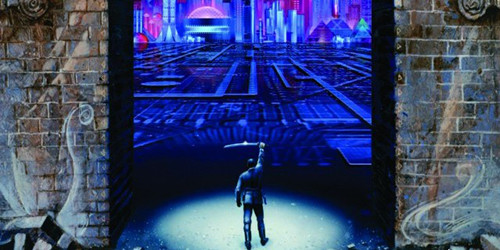Excerpt from the novel Cryptonomicon ![]()
![]() by Neal Stephenson
by Neal Stephenson ![]()
![]()
Bobby Shaftoe has become a connoisseur of nightmares. Like a fighter pilot ejecting from a burning plane, he has just been catapulted out of an old nightmare, and into a brand-new, even better one. It is creepy and understated; no giant lizards here.
It begins with heat on his face. When you take enough fuel to push a fifty-thousand-ton ship across the Pacific Ocean at twenty-five knots, and put it all in one tank and the Nips fly over and torch it all in a few seconds, while you stand close enough to see the triumphant grins on the pilots’ faces, then you can feel the heat on your face in this way.
Bobby Shaftoe opens his eyes, expecting that, in so doing, he is raising the curtain on a corker of a nightmare, probably the final moments of Torpedo Bombers at Two O-Clock! (his all-time favorite) or the surprise beginning of Strafed by Yellow Men XVII.
But the sound track to this nightmare does not seem to be running. It is as quiet as an ambush. He is sitting up in a hospital bed surrounded by a firing squad of hot klieg lights that make it difficult to see anything else. Shaftoe blinks and focuses on an eddy of cigarette smoke hanging in the air, like spilled fuel oil in a tropical cove. It sure smells good.
A young man is sitting near his bed. All that Shaftoe can see of this man is an asymmetrical halo where the lights glance from the petroleum glaze on his pompadour. And the red coal of his cigarette. As he looks more carefully he can make out the silhouette of a military uniform. Not a Marine uniform. Lieutenant’s bars gleam on his shoulders, light shining through double doors.
“Would you like another cigarette?” the lieutenant says. His voice is hoarse but weirdly gentle.
Shaftoe looks down at his own hand and sees the terminal half-inch of a Lucky Strike wedged between his fingers.
“Ask me a tough one,” he manages to say. His own voice is deep and slurred, like a gramophone winding down.
The butt is swapped for a new one. Shaftoe raises it to his lips. There are bandages on that arm, and underneath them, he can feel grievous wounds trying to inflict pain. But something is blocking the signals.
Ah, the morphine. It can’t be too bad of a nightmare if it comes with morphine, can it?
“You ready?” the voice says. God damn it, that voice is familiar.
“Sir, ask me a tough one, sir!” Shaftoe says.
“You already said that.”
“Sir, if you ask a Marine if he wants another cigarette, or if he’s ready, the answer is always the same, sir!”
“That’s the spirit,” the voice says. “Roll film.”
A clicking noise starts up in the outer darkness beyond the klieg light firmament. “Rolling,” says a voice.
Something big descends towards Shaftoe. He flattens himself into the bed, because it looks exactly like the sinister eggs laid in midair by Nip dive-bombers. But then it stops and just hovers there.
“Sound,” says another voice.
Shaftoe looks harder and sees that it is not a bomb but a large bullet-shaped microphone on the end of a boom.
The lieutenant with the pompadour leans forward now, instinctively seeking the light, like a traveler on a cold winter’s night.
It is that guy from the movies. What’s-his-name. Oh, yeah!
Ronald Reagan has a stack of three-by-five cards in his lap. He skids up a new one: “What advice do you, as the youngest American fighting man ever to win both the Navy Cross and the Silver Star, have for any young Marines on their way to Guadalcanal?”
Shaftoe doesn’t have to think very long. The memories are still fresh as last night’s eleventh nightmare: ten plucky Nips in Suicide Charge!
“Just kill the one with the sword first.”
“Ah,” Reagan says, raising his waxed and penciled eyebrows, and cocking his pompadour in Shaftoe’s direction. “Smarrrt—you target them because they’re the officers, right?”
“No, fuckhead!” Shaftoe yells. “You kill ’em because they’ve got fucking swords! You ever had anyone running at you waving a fucking sword?”
Reagan backs down. He’s scared now, sweating off some of his makeup, even though a cool breeze is coming in off the bay and through the window.
Reagan wants to turn tail and head back down to Hollywood and nail a starlet fast. But he’s stuck here in Oakland, interviewing the war hero. He flips through his stack of cards, rejects about twenty in a row. Shaftoe’s in no hurry, he’s going to be flat on his back in this hospital bed for approximately the rest of his life. He incinerates half of that cigarette with one long breath, holds it, blows out a smoke ring.
When they fought at night, the big guns on the warships made rings of incandescent gas. Not fat doughnuts but long skinny ones that twisted around like lariats. Shaftoe’s body is saturated with morphine. His eyelids avalanche down over his eyes, blessing those orbs that are burning and swollen from the film lights and the smoke of the cigarettes. He and his platoon are racing an incoming tide, trying to get around a headland. They are Marine Raiders and they have been chasing a particular unit of Nips across Guadalcanal for two weeks, whittling them down. As long as they’re in the neighborhood, they’ve been ordered to make their way to a certain point on the headland from which they ought to be able to lob mortar rounds against the incoming Tokyo Express. It is a somewhat harebrained and reckless tactic, but they don’t call this Operation Shoestring for nothing; it is all wacky improvisation from the get-go. They are behind schedule because this paltry handful of Nips has been really tenacious, setting ambushes behind every fallen log, taking potshots at them every time they come around one of the headlands….
Something clammy hits him on the forehead: it is the makeup artist taking a swipe at him. Shaftoe finds himself back in the nightmare within which the lizard nightmare was nested.
“Did I tell you about the lizard?” Shaftoe says.
“Several times,” his interrogator says. “This’ll just take another minute.” Ronald Reagan squeezes a fresh three-by-five card between thumb and forefinger, fastening onto something a little less emotional: “What did you and your buddies do in the evenings, when the day’s fighting was done?”
“Pile up dead Nips with a bulldozer,” Shaftoe says, “and set fire to ’em. Then go down to the beach with a jar of hooch and watch our ships get torpedoed.”
Reagan grimaces. “Cut!” he says, quietly but commanding. The clicking noise of the film camera stops.
“How’d I do?” Bobby Shaftoe says as they are squeegeeing the Maybelline off his face, and the men are packing up their equipment. The klieg lights have been turned off, clear northern California light streams in through the windows. The whole scene looks almost real, as if it weren’t a nightmare at all.
“You did great,” Lieutenant Reagan says, without looking him in the eye. “A real morale booster.” He lights a cigarette. “You can go back to sleep now.”
“Haw!” Shaftoe says. “I been asleep the whole time. Haven’t I?”



